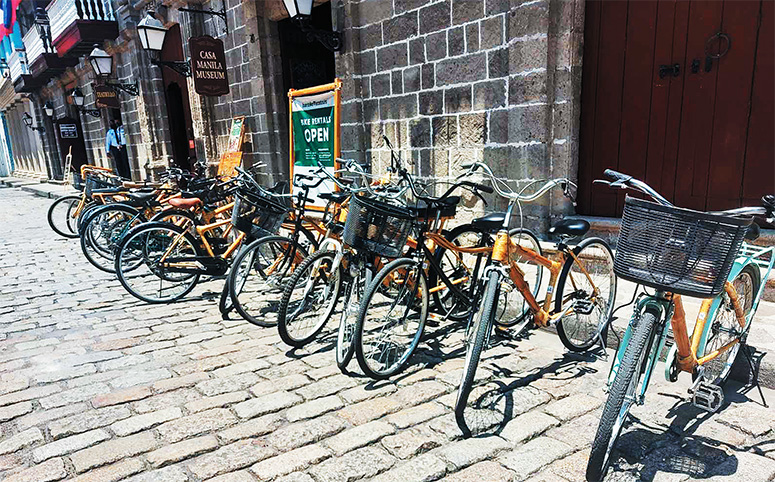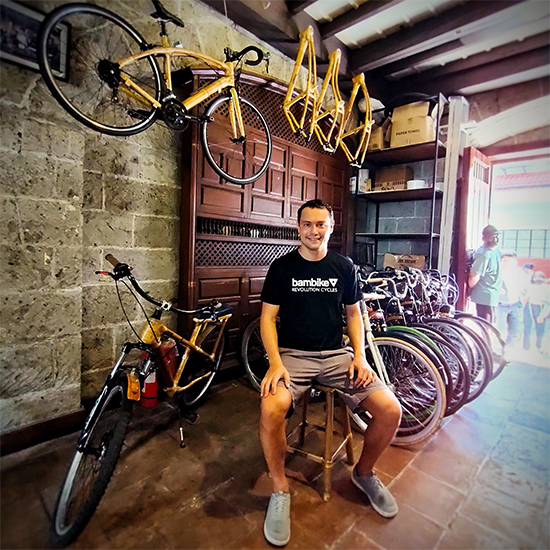No longer the poor man’s timber: Bamboo bikes are in it for the long ride
People. Planet. Progress.
These are the three Ps that make up the philosophy of Brian Benitez McClelland, who chose to open Bambike—a socio-enterprise—in the heart of the cultural and historical place of Intramuros, Manila.
“I felt that my business would have an impact on people and nature,” Brian asserts. “But I wanted it to be a livelihood, so there’s investment in the community, as well as sustainable manufacturing and profit with a purpose in the new, green economy.”
That's what moved Brian to start a business in the Philippines that offers bamboo bikes for people to rent and ride around the city. Deeply inspired by a bamboo bike building project he saw in Africa back in 2007, he built his first bamboo bicycle, known as the Bambike, in 2009.
“I thought I could do a similar project in the Philippines,” he recalls. “So, I brought the technology here, created the bikes, and have been innovating our designs ever since.”

For nature and livelihood
Asked why he chose bamboo as the main material in building his bicycle, Brian says bamboo is the greenest building material in the world.
“It’s a carbon negative product, meaning it’s sequestering massive amounts of carbon dioxide compared to steel. With steel, you need mining, processing, smelting, shaping, importing, transportation, so much embodied energy,” he explains.
“With bamboo, you just have to grow it, chop it and it’s okay,” he elaborates. “And then, of course, there are the environmental services, like soil stabilization, groundwater retention, and it’s grass, so it’s rapidly renewable compared to trees which, when you cut them, are dead. Bamboo will continue to grow.”
With bamboo materials in tow, Brian sought the help of community members from Gawad Kalinga—a Philippine-based community development organization for the poor—to build the Bambikes, dubbing them as the "Bambuilders."

“When I finished college, I was volunteering with Gawad Kalinga and I already felt I really needed to help the community, to give jobs, the people needed a means of livelihood,” he notes. “So, I transitioned from volunteering to job creation to entrepreneurship so I could achieve the same goals but in a sustainable way where we could all earn a living.”
Bumpy roads ahead
When Brian officially established Bambike Revolutionary Cycles in 2010, people, at first, did not see bamboo as a good material for bicycles. This challenged Brian to show his potential customers that Bambikes can be durable and sustainable products.
“It took a long time to prove that bamboo is a good material for bikes, to show that it’s not the poor man’s timber, that it could be a high-end premium design,” he recounts. “It was a long process to shift the perception of the product, to improve the designs, and to communicate really well with our whole supply chain.”
The COVID-19 pandemic took a toll on his business, forcing a few adjustments in his socio-enterprise. Tourism in Intramuros was temporarily suspended, prompting Brian and his team to make some changes.
“The pandemic forced us to adjust. We needed to be prepared to be more resilient because there was no tourism, no bike sales, we shouldn’t be dependent on just one revenue stream,” he looks back.
Adapting to the times was what helped Bambike during the COVID-19 pandemic. Listening to what his customers wanted helped him sustain Bambike amid the challenging times.
I feel fulfilled knowing that our work is striving to improve the environment, it’s made in the Philippines, something to be proud of and to influence our trajectory towards being more sustainable, as a society, as a company, and also through education.
“So, we diversified and adapted, and focused on our customers to serve them better,” Brian discloses. “We adopted a strategy that was more local-focused. Now that foreign tourists are back, we had to adjust anew. Constant adaptation is one of our challenges, but also one of our strengths because we were doing our best to read the situation and adjust accordingly.”
Smoother ride
The pandemic saw a rise in people wanting to use their bikes as a way of commuting. Also, infrastructure for bikes, specifically bike lanes and bike parking, genuinely improved. The demand for bicycles spiked, which helped Bambike Ecotours in its business, after being affected by COVID-19.
“Our bike sales spiked,” Brian relates. “And with the improvements in bike lanes in Metro Manila, we hope our bike sales would improve even more.”
Brian adds that he saw a growing number of customers who wanted to support local and support his advocacy of doing more sustainable building practices.
“Our customers are typically the professionals or middle-aged professionals who are interested in something unique, in green designs,” Brian describes. “Locally, there are customers who want to support local, they love bamboo, or they want to support communities like this.”
Yet, for Brian, the smoother ride in his business is the fulfillment his work has given to the environment and to the Filipino community.
“I feel fulfilled knowing that our work is striving to improve the environment, it’s made in the Philippines, something to be proud of and to influence our trajectory towards being more sustainable, as a society, as a company, and also through education,” he declares. “Being able to share our story with students and young people and all our customers. Sharing with them that it’s sexy to be sustainable.”
Loving what you do
Asked what advice he’d give to other aspiring businesses that have unique products like the Bambike, Brian entices them to explore all their ideas as much as they can.
“Stay curious so you keep asking yourself, your friends, and your customers if what you’re doing is really suitable for you,” he advises. “As an entrepreneur, you need to love what you do. Otherwise, it will really be hard. Starting a business is really hard. To really end up loving what you do, be passionate about the type of business you’re doing because most businesses will fail. That’s the reality, so the ones who make it are founded by entrepreneurs that can see themselves sticking with it. Stay curious, explore, and have fun in the beginning. Make mistakes fast so you know if it’s for you and if you commit, just don’t stop because most people quit just before they are about to succeed. You’ve got to be committed to perseverance in your business.”
He adds, “I’m really happy when I bike. And knowing that it’s gawang Filipino, it’s helping the bamboo farmers, the Gawad Kalinga community where we’re building. For me, it’s malakas at maganda (strong and beautiful). I’m on the right path.”
What’s next for Bambike? Brian reveals plans for expansion and more innovative products in the near future.
“We cannot depend only on tourism. It’s important, too, to create products for the international market,” he explains. “So we adopted bike designs for larger-scale productions with a bolt-together system so we can improve our efficiency, scaleability, and global distribution with our bolt-together series.”
For the Bambike Ecotours, Brian learned that, at present, there is already a demand for outdoor activities and local tourism.
“As we saw during the pandemic, people who mostly traveled abroad are now traveling domestically and looking for semi-adventurous and outdoor experiences, so we expanded to Batangas, where there’s outdoor tour, and there are other locations where we see Bambike Ecotours deploying for domestic tourism,” he shares.
Pedal on, Bambike!


